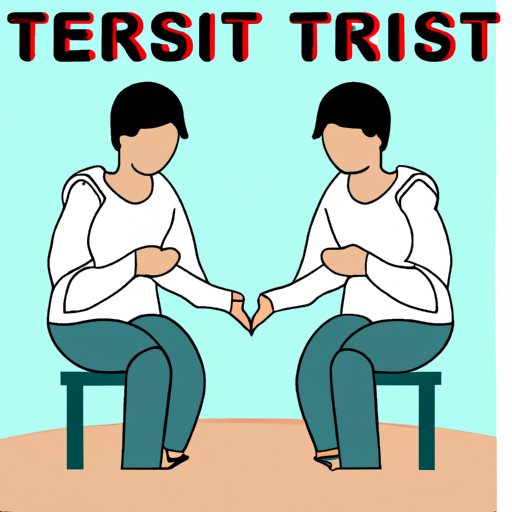Introduction
Insecurity in relationships can be defined as a lack of confidence that interferes with the ability to have a healthy, balanced relationship. Feeling insecure can lead to feelings of anxiety, low self-esteem, and even jealousy. It is important to recognize when you are feeling insecure so that you can take steps to address it. In this article, we will discuss various tips and strategies for overcoming insecurity in relationships.
Communicate Openly and Honestly with Your Partner
One of the most important aspects of any relationship is open and honest communication. When you communicate openly and honestly with your partner, it fosters a sense of understanding and connection. Not only does open communication help to build trust, but it also allows both partners to express their needs and concerns without fear of judgment.
According to Dr. Les Parrott, psychologist and author of High-Maintenance Relationships, “Effective communication requires not only speaking openly and honestly, but also actively listening to what your partner has to say.” Active listening involves paying attention to what your partner is saying, asking questions to clarify their thoughts, and responding in a way that shows you understand their perspective.
Practice Self-Acceptance and Self-Love
In order to overcome insecurity in relationships, it is important to practice self-acceptance and self-love. Self-acceptance means accepting yourself for who you are, flaws and all. It involves recognizing that you are worthy and valuable just as you are. Self-love, on the other hand, is about taking care of yourself and investing in your own wellbeing.
According to psychotherapist Laura Heck, “Self-acceptance and self-love are essential for feeling secure in a relationship. When you practice self-acceptance and self-love, you are able to show up as your true self in the relationship, instead of hiding behind masks of insecurity.” Practicing self-acceptance and self-love can help to reduce feelings of insecurity and boost your self-confidence.

Acknowledge and Validate Your Feelings
It is important to acknowledge and validate your feelings when you are feeling insecure in a relationship. Acknowledging your feelings means recognizing them and giving them space to exist. Validation involves showing understanding and support for your feelings. This could involve expressing empathy or simply letting your partner know that you hear them and understand where they are coming from.
According to therapist Julie Hanks, LCSW, “Acknowledging and validating your feelings helps to create a safe space for both partners to express themselves without fear of judgment. When you are able to be open and honest about your feelings, it can help to reduce feelings of insecurity and foster a deeper connection between both partners.”

Set Healthy Boundaries Within the Relationship
Setting healthy boundaries within a relationship is an important part of maintaining emotional security. Boundaries are limits that are set to protect each person’s emotional and physical wellbeing. They help to define each person’s individual needs and wants, and they provide a framework for how each person should be treated.
According to Dr. John Gottman, author of The Seven Principles for Making Marriage Work, “Healthy boundaries are necessary for any relationship to thrive. They provide structure and clarity, which can help to reduce feelings of insecurity and foster mutual respect.” Setting healthy boundaries can help both partners to feel more secure in the relationship.

Learn to Trust Yourself and Your Partner
Learning to trust yourself and your partner is another important step in overcoming insecurity in relationships. Trusting yourself means having faith in your own judgment and abilities. It involves believing in yourself and your decisions, even when things don’t go as planned. Trusting your partner means having faith in their intentions and actions. It involves believing that they have your best interests at heart.
According to psychiatrist Judith Orloff, MD, “When you trust yourself and your partner, it helps to reduce feelings of insecurity and creates a safe space for both partners to express themselves openly and honestly.” Learning to trust yourself and your partner can help to create a strong foundation for the relationship.
Avoid Comparing Yourself to Others
Comparison is one of the biggest contributors to insecurity in relationships. When you compare yourself to others, it can lead to feelings of inferiority and inadequacy. It can also lead to unrealistic expectations about your relationship, which can further fuel insecurity.
According to psychotherapist Rachel Wright, LMFT, “Comparison is a form of self-sabotage. It can lead to feelings of insecurity, which can be damaging to a relationship. Instead of comparing yourself to others, focus on cultivating a healthy and loving relationship with your partner.” By avoiding comparison, you can begin to appreciate the unique qualities of your relationship.
Focus on the Positive Aspects of Your Relationship
Focusing on the positive aspects of your relationship is another way to overcome insecurity. When you focus on the good things in your relationship, it can help to shift your mindset from negative to positive. It can also help to reduce feelings of anxiety and insecurity, and it can foster a deeper connection between both partners.
According to marriage and family therapist Esther Boykin, LMFT, “Focusing on the positive aspects of your relationship can help to reduce feelings of insecurity and foster a stronger bond between both partners. Take time to appreciate the little moments, celebrate your successes, and enjoy the unique experiences that your relationship has to offer.”
Conclusion
In conclusion, there are many tips and strategies for overcoming insecurity in relationships. These include communicating openly and honestly with your partner, practicing self-acceptance and self-love, acknowledging and validating your feelings, setting healthy boundaries, learning to trust yourself and your partner, avoiding comparison, and focusing on the positive aspects of your relationship. By implementing these tips and strategies, you can begin to cultivate a secure and loving relationship with your partner.
Remember, overcoming insecurity in relationships takes time and practice. Be patient with yourself and your partner, and focus on creating a safe and supportive environment. With patience, understanding, and effort, you can learn to overcome insecurity and foster a healthy, loving relationship.
(Note: Is this article not meeting your expectations? Do you have knowledge or insights to share? Unlock new opportunities and expand your reach by joining our authors team. Click Registration to join us and share your expertise with our readers.)
